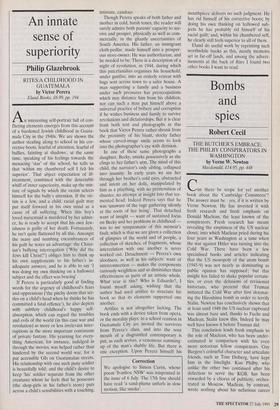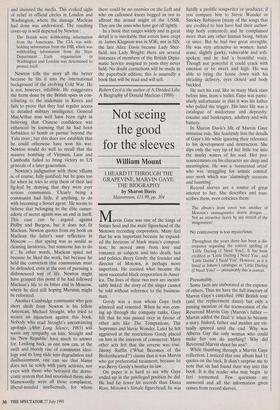Bombs and spies
Robert Cecil
THE BUTCHER'S EMBRACE: THE PHILBY CONSPIRATORS IN WASHINGTON by Verne W. Newton Macdonald, £14.95, pp. 448 Can there be scope for yet another book about the 'Cambridge Comintern'? The answer must be : yes, if it is written by Verne Newton. He has invested it with fresh research and fresh emphasis on Donald Maclean, the least known of the conspirators. Fresh research has meant revealing the emptiness of the US nuclear closet, into which Maclean pried during his four years in Washington at a time when the war against Hitler was turning into the Cold War. There have been a few specialised books and articles indicating that the US monopoly of the atom bomb (1945-9) was not nearly as dominating as public opinion has supposed ; but this insight has failed to shake popular certain- ties, or even the delusions of revisionist historians, who pretend that Truman initiated the Cold War after first detonat- ing the Hiroshima bomb in order to terrify Stalin. Newton has conclusively shown that at least until 1948 the US nuclear cupboard was almost bare and, thanks to Fuchs and Maclean, Stalin knew this. Indeed he may well have known it before Truman did.
This conclusion lends fresh emphasis to the role of Maclean, who has been under- estimated in comparison with his even more notorious fellow conspirators. Guy Burgess's colourful character and articulate friends, such as Tom Driberg, have kept him in the limelight. Kim Philby, who unlike the other two continued after his defection to serve the KGB, has been rewarded by a chorus of publicity, orches- trated in Moscow. Maclean, by contrast, wrote nothing about his nefarious career and shunned the media. This evoked sighs of relief in official circles in London and Washington, where the damage Maclean had done was understood. The resulting cover-up is well depicted by Newton :
The British were withholding information from the Americans. The CIA was with- holding information from the FBI, which was withholding information from the State Department . . . Each organisation in Washington and London was determined to protect itself.
Newton tells the story all the better because he fits it into the international background of the evolving Cold War. He is not, however, infallible. He exaggerates the harm done by the British spies in con- tributing to the stalemate in Korea and fails to prove that they had regular access to detailed military intelligence. General MacArthur may well have been right in believing that Chinese confidence was enhanced by knowing that he had been forbidden to bomb or pursue beyond the Yalu river ; but this does not establish that he could otherwise have won his war. Newton would do well to recall that the massive bombing of Vietnam, Laos and Cambodia failed to bring victory to US generals of a later generation.
Newton's indignation with these villains is, of course, fully justified; but he goes too far when he tries to strip them of their last fig-leaf by denying that they were ever serious communists. 'Clearly being a communist had little, if anything, to do with becoming a Soviet agent.' He seems to believe that belonging to the elite camer- aderie of secret agents was an end in itself. This case can be argued against Philby and Burgess, but it does not fit Maclean. Newton quotes from my book on Maclean the latter's sour reflection in Moscow — that spying was as sordid as cleaning lavatories, tut someone has to do it '. in other words, Maclean spied not because he liked the work, but because he held the conviction that communism must be defended, even at the cost of pursuing a dishonoured way of life. Newton might have grasped this point if he had followed Maclean's life to its bitter end in Moscow, where he died still hoping Marxism might be reformed.
Another Cambridge communist who gets short shrift from Newton is his fellow American, Michael Straight, who tried to secure an injunction against this book. Nobody who read Straight's unconvincing apologia (After Long Silence, 1983) will waste any sympathy on him. Straight and his 'New Republic' have much to answer for. Looking back, as one now can, at the swift and bloody rise of communist ideo- logy and its long slide into degradation and disillusionment, one can see that blame does not lie solely with party activists, nor even with those who betrayed the demo- cratic system that had nourished them; also blameworthy were all those complacent, liberal-minded intellectuals, for whom
there could be no enemies on the Left and who on calloused knees begged us not to affront the armed might of the USSR. They are the ones who have got off lightly.
In a book that ranges widely and in great detail it is inevitable that errors have crept in. James Klugman was in SOL, not in SIS; the late Alice Davis became Lady Sher- field, not Lady Wright; there are several instances of members of the British Diplo- matic Service assigned to posts they never held. No doubt corrections will be made in the paperback edition; this is assuredly a book that will be read and will sell.
Robert Cecil is the author of A Divided Life: A Biography of Donald Maclean (1988)



















































 Previous page
Previous page